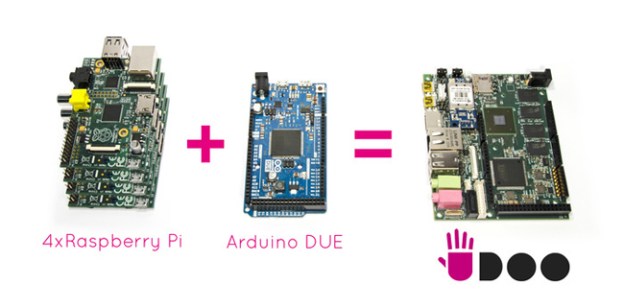 A Raspberry Pi may be cheap, but it also isn’t very powerful. You’re really out of luck if you want to work on a project that has a touchscreen or needs Wi-Fi connectivity because the $25 mini computer just isn’t equipped to handle those technologies.
A Raspberry Pi may be cheap, but it also isn’t very powerful. You’re really out of luck if you want to work on a project that has a touchscreen or needs Wi-Fi connectivity because the $25 mini computer just isn’t equipped to handle those technologies.
UDOO, the newest single-board computer to take Kickstarter by storm, aims to give ambitious DIYers the computing oomph they need to turn their ideas into reality (or at least be able to test them out cheaply and easily).
Just how powerful is the UDOO? According to its Kickstarter project page, one UDOO is equivalent to four Raspberry Pis, combined. As you can see in this illustration from Team UDOO, the mini computer is literally crammed with all the latest components you can imagine: an ARM-based processor, support for the Ardurino DUE board, an Ethernet port, Wi-Fi chip, an HDMI out, and touchscreen support. On the software side, this mini computer runs both Android 4.0 and Linux, which is ideal for projects that need to work on both platforms.

There are two basic configurations of the UDOO that you can back, depending on how much you want to pledge.
You need to hand over at least $99 to get the entry-level “Early Bird” UDOO, which uses the dual-core cortex-A9 Freescale processor and has both Wi-Fi chip and Ethernet plug. Only 77 units are available at this price point as of this writing, so you’ll have to pay $109 for the same device once this “Early Bird” category sells out. If you rather have the variant with the quad-core chip, you’ll need to pledge no less than $129. The cheaper “Early Bird” special for this more powerful configuration has already sold out.
UDOO has already met its modest funding goal of $27,000, even though its campaign won’t wrap until June 8, so backers don’t have to worry about this product not making it past Kickstarter. In fact, it has already raised over $147,000 and the number keeps increasing as we write this post. According to the team behind this device, UDOO is about 80 percent ready to be manufactured, which means it should be able to meet its estimated ship date of September 2013.
Editors' Recommendations
- Arduino vs. Raspberry Pi
- Powerful upgrades turn 4th-gen Raspberry Pi into a more capable $35 desktop


